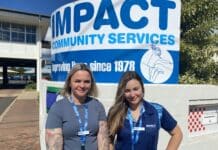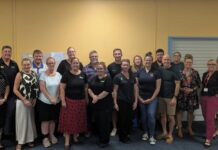
Barista training courses are being offered in Childers and Bundaberg for people wanting to learn the basics or develop their skills to secure employment in the hospitality industry. We take a look at what makes a good barista …
Finding the perfect cup of coffee can make you feel a little bit like Goldilocks but once you’ve found the barista who brews to your taste it’s hard not to return every morning.
What makes an ideal cappuccino or latte that has you going back to the same cafe?
Is it the temperature of the coffee, the body of flavour or just that smile you receive when greeted?
Grindstone Coffee House owner Kristy Curd says it’s a combination, but the most important thing is for the barista to have is a heart full of passion to provide a consistent beverage to each individual customer.
“To make the perfect cup you really have to know your customer,” Kristy said.
“It’s the details from their name, to what they have, whether they like it hot or not, these all make the difference in a good or bad experience and to me to be a good barista you have to have the consistency.”
Young employees pour their heart into coffee
Kristy opened the doors to Grindstone Coffee House three years ago and prides herself on employing younger people who are willing to pour their heart into serving an ideal coffee every time.
“They (the staff) know the customer’s name when they walk in, and the customer knows theirs, we turn around and say, ‘just the usual?’ because we know how they like their coffee,” she said.
“To be a barista you’ve got to have the passion to please people, make the customer comfortable and remembering their names is good step in the right direction.
“Just like Jesse, he is an incredible young man that has a passion for coffee. He prides himself on remembering people’s names and their orders.
“I take pride knowing my staff want to please the customers, make them comfortable and have them wanting to return again.”
With eight employees at Grindstone Coffee House, Kristy said each barista was different and learnt in various ways. Some enjoyed watching YouTube video and perfecting the design on top of the coffee, while others were more hands-on and learnt on the job.
“To me, what makes a good cup of coffee is different to a lot of other people,” Kristy said.
“Latte art isn’t important to me, people can spend time focusing on this and over stretch the milk or make the coffee too hot.
“The real art to coffee is not the design on top but knowing the coffee, the cleanliness behind making it, the date of the coffee and storing it.”
Kristy said she only used one type of coffee and it was roasted in Maleny and only had a five-week shelf life.
“It’s not mass produced so we know what we are getting,” she said.
“We clean our machine every day and weigh the coffee every hour as the environment can change the coffee – if it’s humid or dry it will affect it.”
Kristy said once the knowledge of the coffee was achieved the milk became the most vital part in ensuring the flavour profile was faultless.
She said stretching the milk with a temperature guide was essential, especially for beginners, and at Grindstone they heated the milk between 65 and 70 degrees unless a hotter coffee was requested by the customer.
Barista skills can take you anywhere
Kristy said during the past three years she had helped train incredible young Bundaberg people, and some had now taken their passion for coffee to bigger places.
“A lot of the crew moved on last Christmas and went on to uni, or moved to Melbourne, the cafe capital of Australia, and continue to make coffee because it’s their passion,” she said.
“Knowing how to make a perfect cup of coffee can take you anywhere in the world, where ever you go people will always drink coffee and you’ll find a job anywhere once you have the skills.”
Barista training and coffee art course
The barista training courses are being offered by Training Ideas.
Advanced barista participants will learn about coffee blends and flavour profiles, how to monitor quality and service of espresso coffee and a variety of techniques including basic coffee art.
To enrol in the advanced barista course, it’s mandatory you have attended the basic barista course first or are currently working as a barista to enrol directly into this training.
There will also be basic barista courses in Childers on 28 November and Bundaberg on 1 December.
Participants will learn about making the latest espresso coffee styles and beverages by using our commercial coffee equipment, how to dose, tamp and extract correctly, basic milk texturising and free pouring techniques, industry barista, safety and hygiene standards, how to complete multiple coffee orders effectively and finally the important cleaning and maintenance of equipment.
Basic Barista Statement of Attendance Certificates are issued to all participants on successful completion of training.
For more course information phone 0437 733 537 or email debbie@trainingideas.com.au.
- Other news: Thousands of native bees battle it out at coffee farm







